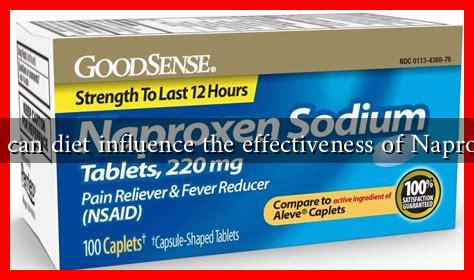-
Table of Contents
How Can Diet Influence the Effectiveness of Naproxen?
Naproxen is a nonsteroidal anti-inflammatory drug (NSAID) commonly used to relieve pain, reduce inflammation, and lower fever. It is often prescribed for conditions such as arthritis, menstrual pain, and other inflammatory disorders. While the medication itself plays a crucial role in managing these symptoms, the effectiveness of Naproxen can be significantly influenced by dietary choices. This article explores how diet can impact the efficacy of Naproxen, providing insights into food interactions, nutrient absorption, and overall health.
The Role of Diet in Drug Absorption
The absorption of medications like Naproxen can be affected by what we eat. Certain foods can either enhance or inhibit the drug’s effectiveness. Here are some key dietary factors to consider:
- High-Fat Meals: Consuming Naproxen with a high-fat meal can increase its absorption, leading to higher plasma concentrations of the drug. This can enhance its pain-relieving effects but may also increase the risk of side effects.
- Calcium-Rich Foods: Foods high in calcium, such as dairy products, can bind to Naproxen and reduce its absorption. This interaction may diminish the drug’s effectiveness, particularly in individuals who rely on it for chronic pain management.
- Fiber Intake: A high-fiber diet can slow down the absorption of medications. While fiber is essential for digestive health, excessive intake may delay the onset of Naproxen’s effects.
Food Interactions with Naproxen
Understanding specific food interactions can help patients optimize their Naproxen regimen. Some foods and beverages to be cautious about include:
- Alcohol: Consuming alcohol while taking Naproxen can increase the risk of gastrointestinal bleeding and liver damage. It is advisable to limit or avoid alcohol during treatment.
- Caffeine: Caffeine may enhance the analgesic effects of Naproxen, making it more effective for pain relief. However, excessive caffeine intake can lead to increased side effects such as jitteriness and insomnia.
- Grapefruit: Grapefruit and its juice can interfere with the metabolism of various medications, including some NSAIDs. While specific studies on Naproxen are limited, it is generally wise to avoid grapefruit when taking medications.
The Impact of Nutritional Status
A well-balanced diet is essential for overall health and can influence how effectively medications work. Nutritional deficiencies can impair the body’s ability to metabolize drugs, including Naproxen. Key nutrients that play a role include:
- Omega-3 Fatty Acids: Found in fish, flaxseeds, and walnuts, omega-3 fatty acids have anti-inflammatory properties that may complement the effects of Naproxen, potentially reducing the required dosage.
- Antioxidants: Foods rich in antioxidants, such as fruits and vegetables, can help reduce inflammation and oxidative stress, potentially enhancing the overall effectiveness of Naproxen.
- Magnesium: This mineral is crucial for muscle and nerve function. A deficiency may lead to increased pain sensitivity, which could affect how well Naproxen alleviates pain.
Case Studies and Research Findings
Several studies have examined the relationship between diet and the effectiveness of NSAIDs like Naproxen. For instance, a study published in the Journal of Clinical Pharmacology found that patients who maintained a balanced diet rich in anti-inflammatory foods reported better pain management outcomes when using Naproxen compared to those with poor dietary habits. Additionally, a clinical trial indicated that patients who consumed omega-3 supplements alongside Naproxen experienced reduced inflammation and pain levels.
Conclusion
Diet plays a significant role in the effectiveness of Naproxen and other medications. By understanding how food interactions, nutrient absorption, and overall nutritional status can influence drug efficacy, patients can make informed dietary choices that enhance their treatment outcomes. Key takeaways include:
- High-fat meals can increase Naproxen absorption, while calcium-rich foods may reduce it.
- Alcohol and grapefruit should be avoided to minimize adverse interactions.
- A balanced diet rich in omega-3 fatty acids, antioxidants, and magnesium can support the effectiveness of Naproxen.
Ultimately, consulting with a healthcare provider or a registered dietitian can provide personalized dietary recommendations that align with medication regimens, ensuring optimal health and pain management.

